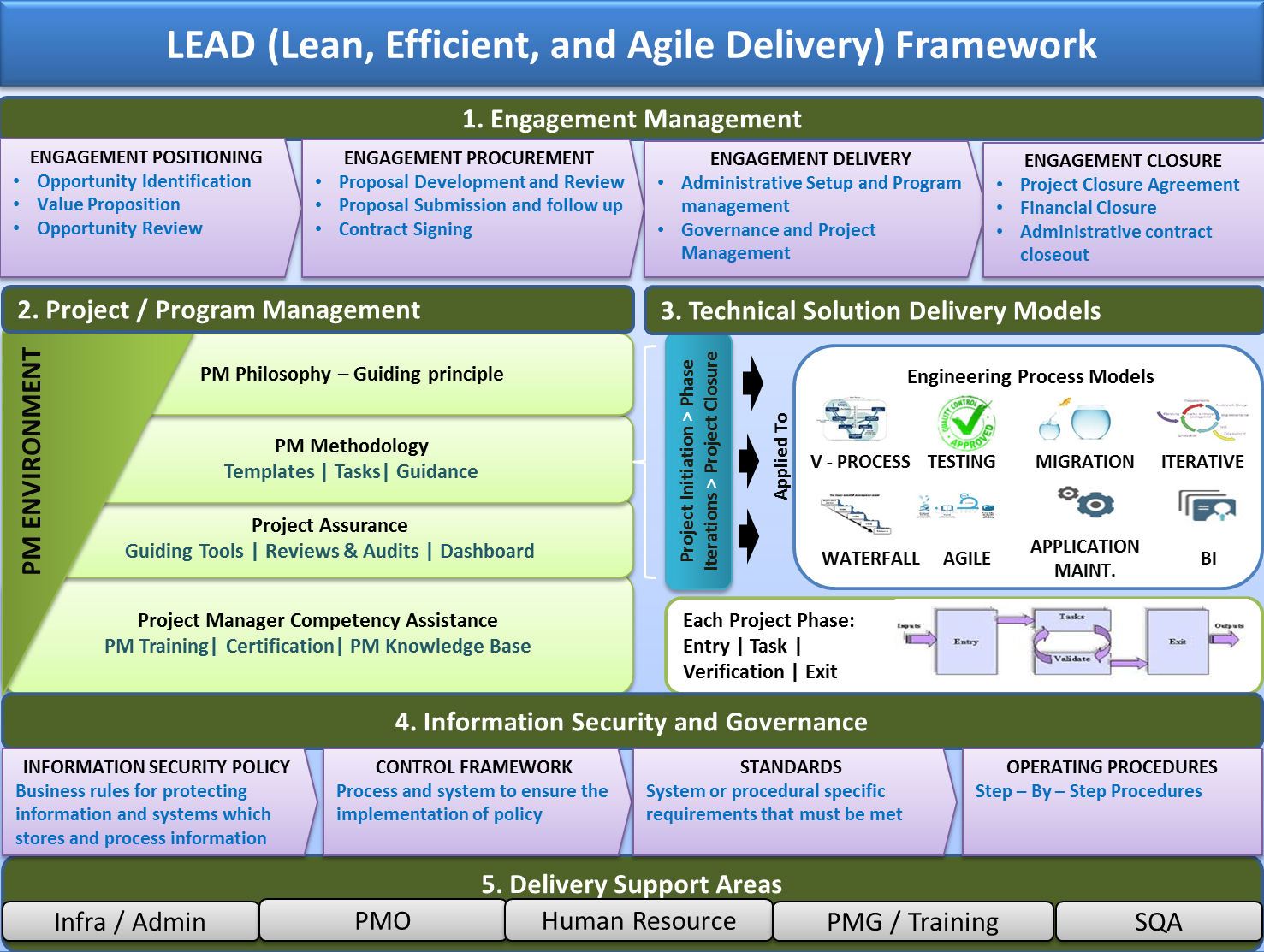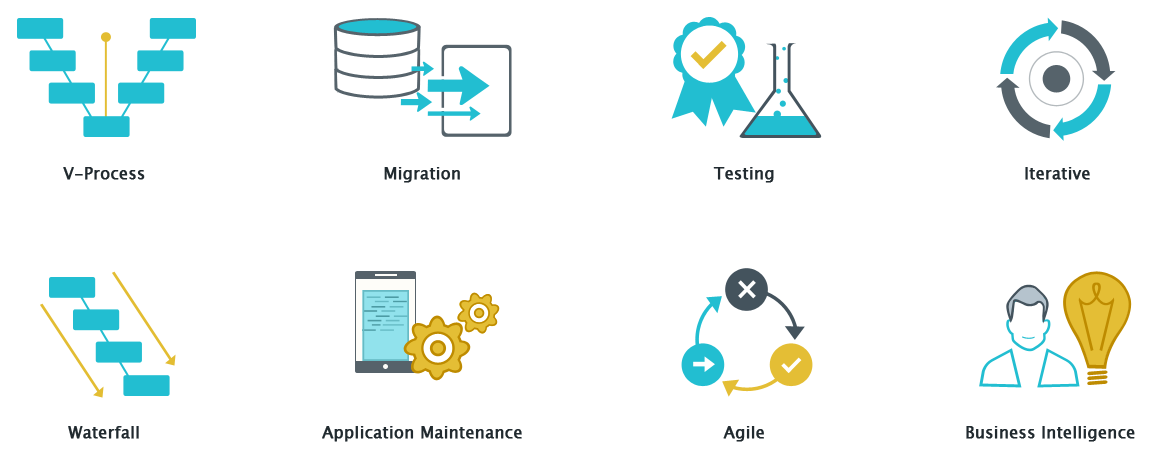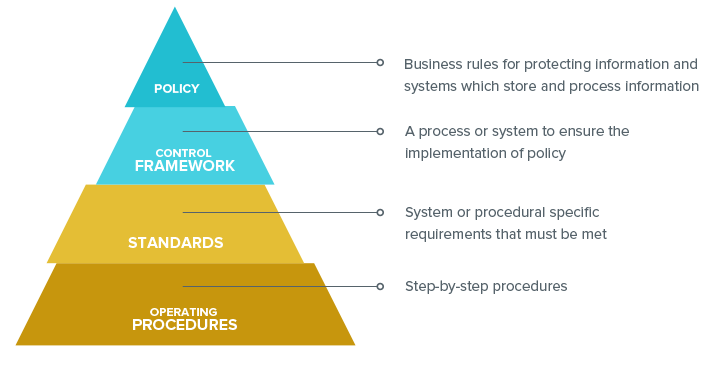LEAD (Lean, Efficient, and Agile Delivery) Framework depicts a great advance towards process integration across various functions in our company.
Consisting of multiple interrelated component frameworks, LEAD brings together our collective intellectual capital and rich experience in process maturation. The resultant wealth of practices, processes, tasks and procedures is organized in alignment with the way Lead IT operates.
The Engagement Management component framework of LEAD focuses on providing processes and guidelines required to identify suitable business opportunities, positioning for these opportunities, converting opportunities into contractual agreements, and handing over the projects from sales organization to delivery organization for execution and delivery of the project to the customers. Standardized Templates and forms align with the process definitions and provide uniform way of execution across the organization. In addition, Engagement Management fosters close cooperation among all the groups that are involved throughout the lifecycle of our contractual relationship with our clients, and reduces risk to successful delivery with accurate deal qualification, consistent hand-offs, and frequent governance checkpoints.
The Engagement Management component framework of LEAD focuses on providing processes and guidelines required to identify suitable business opportunities, positioning for these opportunities, converting opportunities into contractual agreements, and handing over the projects from sales organization to delivery organization for execution and delivery of the project to the customers. Standardized Templates and forms align with the process definitions and provide uniform way of execution across the organization. In addition, Engagement Management fosters close cooperation among all the groups that are involved throughout the lifecycle of our contractual relationship with our clients, and reduces risk to successful delivery with accurate deal qualification, consistent hand-offs, and frequent governance checkpoints.
LEAD Framework offers Project and Program Management methodologies that form the foundation of our thorough Project Management Environment enabling Solution Delivery Management. This supportive environment assures project success by ensuring repeatability of results across clients, industries, markets and geographies, enabling metrics-driven transparency throughout the project portfolio, encouraging propagation of knowledge and best practices across Global Delivery, and providing a strong foundation of project and program manager competency.
The Project Management Environment consists of project management philosophy which is the guiding principle for our project managers to manage the projects and programs. In addition, a robust project management methodology provides standard method of managing the projects. Project Assurance ensures failsafe delivery – methods and controls to ensure that project is on track. And last but not the least, the PM competency assistance enabling our project managers to enhance their skills and increase their subject area knowledge by using the PM knowledge Base.
The Project Management Methodology (PMM) is one of the significant components of the Project Management Environment. PMM is the standard method for managing Lead IT managed engagements, applicable to both deliverable-based and SLA based projects. Lead IT uses a life cycle model to describe and lay out its project management approach. It recognizes that during the course of a project, there are certain tasks that are performed once and some tasks that are performed continuously. The point-in-time tasks generally occur at the beginning and at the end of the project, and grouped under Project Initiation and Project Closure phases of the PMM. The continuous tasks generally serve to monitor and control the project, and are collected in the Project Control process group.
Our delivery management model is flexible enough to map to multiple engineering work streams - each having a different, sometimes variable, number of phases. PMM is designed to fulfill this requirement by identifying a set of tasks that are performed in a cyclical fashion, once for each phase of the target work stream. Iteration comprises planning, execution and closure activities. This design allows PMM to be the common methodology used to manage every technical solution LeadIT delivers to its clients.
The practices in the PMM model correspond to PMI's generic knowledge areas. There are others that represent specific needs or focus areas of consulting engagements. Each practice has a group of related tasks that occur in a particular phase or process group of the life cycle. The project management methodology contains descriptions of practices and tasks, including detailed guidance on their execution, and templates for all anticipated deliverables.
Various Engineering Process Models enable and guide the project teams on Technical Solution Delivery. The PMM described earlier can be applied to these process models to manage the work.
This LEAD component framework offers details on how technical teams develop, maintain and deliver solutions that fulfill the requirements, achieve quality goals, deliver performance and realize value.
Information Security and Governance component of LEAD offers a series of guidelines, policies, procedures, standards and templates that help manage risk to information assets. This comprehensive Information Security Management System protects Lead IT and its clients with a systematic approach to assuring acceptable levels of information security risk.
As depicted in the picture, the security policy defined in the framework provides business rules for protecting information. The Control framework lays out process and system to ensure the implementation of policies. Standards are defined to that should be met while implementing the policies to ensure effectiveness and uniformity across the projects in organization. The Operating procedures provide step by step method of implementing the policies
Finally, Delivery Support Area of LEAD provides insight into services that are provided by Lead IT Support Organizations that support delivery execution: PMG, Training, SQA, HR, Admin and PMO.




